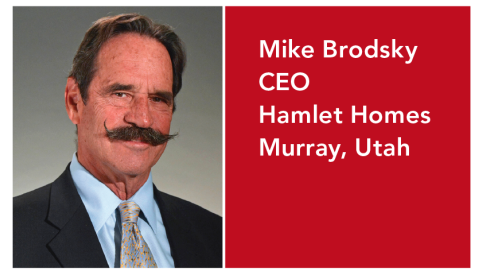An interesting philosophy is at work at The Green Cos. The Newton, Mass.-based builder is an established player in a niche market that is suddenly attracting a lot of competition -- empty nester housing for aging baby boomers. While not dismissive of all the new players in the market, management is remarkably unconcerned.
| The Green Cos.’ management team includes (clockwise from back left) Dan Green,Tony Green, David Caligaris and Alan Green. |
"Anyone can build a house," explains president David Caligaris. "The question we focus on is, ‘What would it take for another company to build a home for our customers?’ As long as we can supply that answer by knowing our buyers better than anyone else, I’m not worried about competition."
Green believes it can deliver homes buyers will want better than the next builder for several important reasons. First, the company’s approach to permitting limits competition. Led by principal Tony Green, The Green Cos. selects sites that require complicated special permits that are discretionary rather than "by right." "We utilize open space and natural resources -- water, woods, elevations -- as a view shed in return for smaller lots or multifamily homes," explains Tony Green. "We work with local zoning boards in the planning process in open, informal meetings so they understand how our communities will bring public value."
| The Green Cos.’ marketing team includes (clockwise from back left) Leslie LeBlanc, John Daly, Sheila Schimmel, Dominique Sampson, Nancy Hardaway and Dan Almas. |
Thorough market research with buyers and brokers helps Green create the homes that meet current customer needs. "We design and site homes with features customers value, though not always consciously: views of open space that visually bring the outdoors in, creative interior shapes that maximize views and light, and lush landscaping for privacy and a feeling of permanence," explains vice president Dan Green. "With these features we are able to attract buyers and sell our homes at prices well above market averages."
While all of these things are important to the company’s success, Green management says they are secondary. The company’s people are Green’s unique proposition that helps Caligaris and the rest of the management team -- chairman and company founder Alan Green, Tony Green, Dan Green and total quality administrator Sheila Schimmel -- sleep at night. The unique part people play in the new home selling equation is of supreme importance at Green. Keeping employees engaged and enthusiastic about delivering homes to very particular customers at prices significantly higher than the area average is what management believes sets Green apart.
"Mood translates to the customer," explains Caligaris. "Our people are excited about the company, the homes we build and the work they do. Customers sense this enthusiasm and want to be a part of it. That’s a significant selling advantage."
| Tony Green takes local zoning board members on a property tour of a proposed development. The Green Cos.’ open, inclusionary approach to permitting helps the company secure land that sets its developments apart from the competition. |
As the company grows and opens new communities, management is carefully trying to preserve its entrepreneurial culture while improving processes, upgrading systems and creating a more streamlined organization. Achieving these objectives requires deliberate effort, with particular care paid to the people who are part of the process.
"People are the heart of our company," says Alan Green. "They make everything happen, and it is up to us in management to create a workplace where everyone is as productive as they can be, yet they still have fun at the job."
A New Way of Working
Total Quality 2000 is The Green Cos.’ blueprint to upgrade its systems and processes. Introduced in March 1998, the plan involves the 63 Green Cos. associates in every department. However, the rollout of Total Quality 2000 has been slow by design. "For the program to really work, our people must own it," explains Dan Green. "To say to them, ‘This is how we’re going to work from now on’ just wouldn’t work. Their input and buy-in are important."
While some of the company’s quality initiatives have been rolled out companywide, one of Green’s most successful developments, Kings Way in Yarmouth Port, Mass., has been the test case for the majority of operational changes. This Cape Cod empty nester condominium development accounted for 50% of the company’s 1998 sales.
"We picked this development because we needed wins early in the program," explains Caligaris. "We needed the rest of the company to see that quality management tools lead to better results."
The most significant operational changes and process improvements tested in this site include:
- Slotting: Evening production work flow was key to improving customer satisfaction -- the overriding goal of The Green Cos.’ quality effort. Construction supervisors and subcontractors needed to work more efficiently to deliver homes 100% complete when promised. However, coming up with the system to do this didn’t happen overnight.
"Developing the process that we now call slotting involved every person on the site," explains Caligaris. "For 90 days we dissected the way we build and then totally reworked the process. All the suggestions for improvement came from the people doing the work."
The system devised at Kings Way accomplished the company’s goal. Construction volume stabilized. Cycle time dropped, and most important, customer satisfaction scores went up. In the fourth quarter of 1998, customer surveys showed that 100% of the buyers would recommend The Green Cos. and 100% of the homes were delivered when promised. These numbers are significantly higher than overall company figures.
The improved efficiency and increased production at Kings Way occurred though only one person was added to the site. "We worked smarter by rethinking the way we build," said Caligaris. "We panelize for quicker assembly. We partner with our trades and suppliers to make them a part of the improvement team."
- Trade Partnering: Involving trades in its quality efforts has been one of the most difficult parts of the process for The Green Cos. "Many trades and suppliers felt that partnering means they will do more for less money," says Dan Green. "To counter this, we focus on how they can earn more money if they become more efficient."
Though initially skeptical, Green’s subcontractors at Kings Way have become believers in the company’s quality efforts. The framing company, Shawnlee Construction, saw little value in panelizing initially, but the owner, foreman and crew agreed to keep an open mind. On average, it took 200 man-hours to frame a home. If a home were completed in fewer man-hours, the foreman and crew would get a share of the savings. By working with Green’s construction personnel and the panelizer, Shawnlee has reduced the five weeks necessary to frame a three-home building to just three. The foreman and crew get paid more because of their share of the savings, and as an added benefit, scheduling has improved. A new home is started each Monday, while one is finished each Friday.
"We are much more organized, and the amount of downtime has really dropped," explains Shawnlee’s foreman. "We’ve been able to reduce our crew size and increase our production by 30% because we’re not always retraining our people."
Ongoing communication is key to keep quality initiatives on track at Kings Way. Weekly toolbox talks among site superintendents, project managers and the trades provide a forum to talk about issues affecting productivity. They are also a place to discuss ways to make the site safer.
- Customer Expectations: Most of The Green Cos.’ buyers have lived in the same house for a long part of their adult lives and are inexperienced in the new home buying process. To answer questions and manage expectations, Green relies on fully merchandised models with sample "what you get" homes, a homeowner guide detailing the construction process, customer contact with existing homeowners via the Ambassador program, and a sales information checklist to ensure that complete information is communicated.
"Buyers are an integral part of our sales process," explains Dominique Sampson, vice president of sales and marketing. "Through our Ambassador program, prospects meet with homeowners to discuss their homes, the community and their experience with our company. These folks are our best salespeople."
Over the past five years, buyer referrals have been 25% of the company’s traffic and 34% of sales. To understand how buyers feel about the company and their homes, Green uses a five-point feedback system. All buyers are surveyed in-house while a third party surveys homeowners 30, 90 and 330 days after closing.
- Warranty Service and Repair: One service and repair coordinator is on site at each of Green’s developments. This individual receives all service requests and enters each into the company service and repair software. Each request is tracked from the time it is received until the matter is resolved. Construction is responsible for all service work completion.
All service requests are targeted for verbal response within 24 hours, an inspection within 48 hours and resolution of the issue within 10 days. The company charts compliance and reviews it monthly. It also tracks customer satisfaction with service, as well as the number of visits required to fix a problem.
"All of these charts track items that are critical to the quality of our service," explains Caligaris. "We need to be good at all of them in order to exceed our customers’ expectations."
A Profitable Marriage
Total Quality 2000 is The Green Cos.' effort to marry its core strengths with greater operations efficiencies and better customer responsiveness. The results at Kings Way provided the early wins needed to roll out the program companywide. Doing so won’t be without some disruption, but the risks of not moving forward are greater, as Caligaris explains:
"Our buyers -- as well as our employees and suppliers -- absolutely drive the long-term success of our company. In an industry that gets more competitive each year, we expect customer satisfaction to be as important a point of differentiation in the future as location, design and sense of community are for us today."
"More than ever, our customers have many alternatives. Towns can be selective in who they choose to rezone land for. Buyers have more empty nester-oriented communities to choose from as more builders recognize the strength of this market segment. Our employees have many options in this low-unemployment environment, and our suppliers can be selective for whom they choose to work."
"How each feels and talks about us defines our reputation. We must be and stay the company of choice."
Also See:
Weekley Fine-Tunes Customer Satisfaction Measures
Advertisement
Related Stories
Hamlet Homes' Mike Brodsky on Finding Successors and Letting Go
A transition that involved a national executive search, an employee buyout, and Builder 20 group mentorship to save the deal
Time-Machine Lessons
We ask custom builders: If you could redo your first house or revisit the first years of running your business, what would you do differently?
Back Story: Green Gables Opens Up Every Aspect of its Design/Build Process to Clients
"You never want to get to the next phase and realize somebody's not happy."






